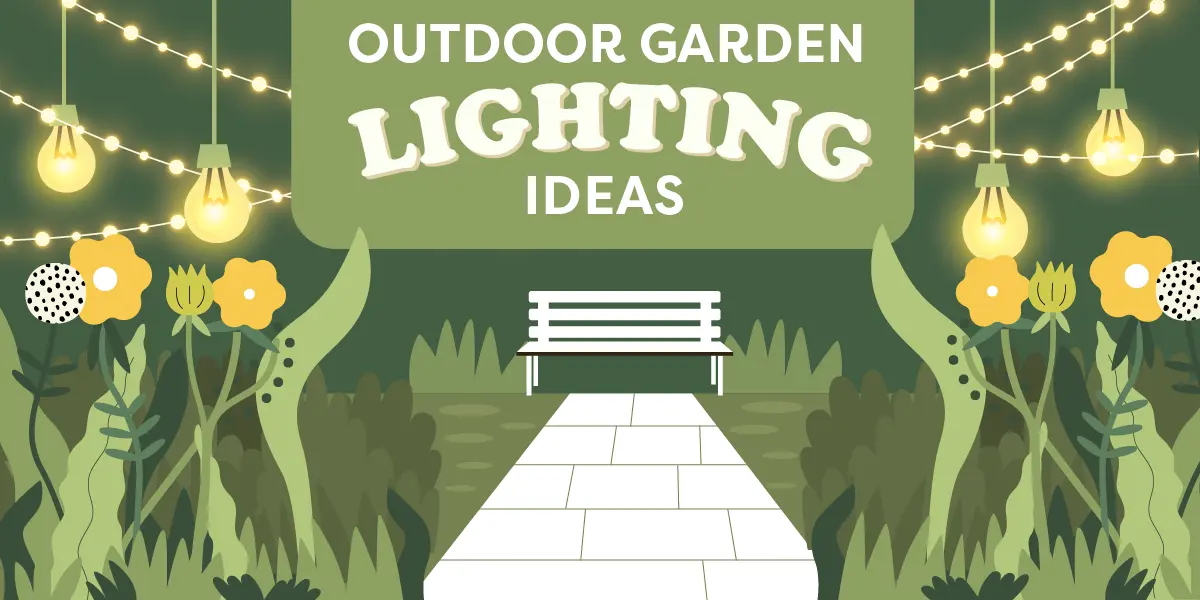Imagine a dark woodland area at night.
Would you be drawn to it? Would you linger? Probably not, unless you’re a vampire.
Likewise, a dark backyard with deep shadows can feel more menacing than inviting. But an accent light here and there, a beam to highlight, and a string of fairy lights or two may be all you need to transform your gloomy nighttime garden into a welcoming wonderland.
In this blog, we offer a few ideas to get you started.
12 Easy DIY Outdoor Lighting Ideas
1. Mason Jar Lanterns
You’ll need mason jars, battery-operated LED lights, heavy gauge wire, pliers, and a metal ring for each jar.
- Clean and dry the mason jar.
- Cut a wire handle approximately 24 inches long. Use pliers to bend the wire into a handle shape, looping it around the neck of the mason jar beneath the rim.
- Secure the handle and adjust it to hang evenly.
- Place a battery-operated LED light inside the jar.
- Use hooks or sturdy tree branches to suspend the mason jar lanterns at various heights around your garden.
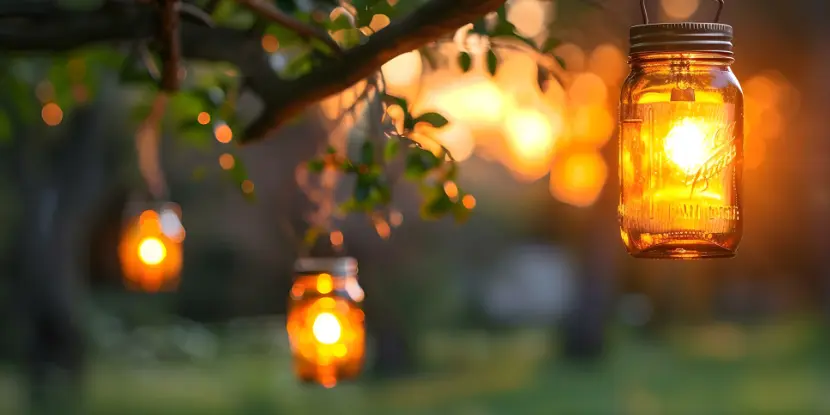
Mason jar lanterns are a beautiful and inexpensive DIY lighting solution.
2. Solar-Powered Fairy Lights
- Stake the solar panel into the ground or mount it on a fence or wall, facing the sun in direct sunlight.
- Carefully string the fairy lights along pathways, around trees, or through shrubs, using hooks, garden staples, or twist ties to hold them in place.
- Spread the lights out evenly to create a magical effect.
- Set the fairy lights to illuminate your garden at dusk with a soft, pleasant glow.
3. Solar-Powered Pathway Lights
- Walk along the path at night to identify areas that need extra illumination. Aim for consistent spacing.
- Place the solar lights where they’ll receive direct sunlight during the day. This ensures the solar panels will recharge.
- Install the pathway lights by embedding their stakes into the ground. Push the stakes into firm soil to prevent tilting or falling.
- The lights will turn on at dusk to brighten the pathway and enhance the aesthetics of your garden.
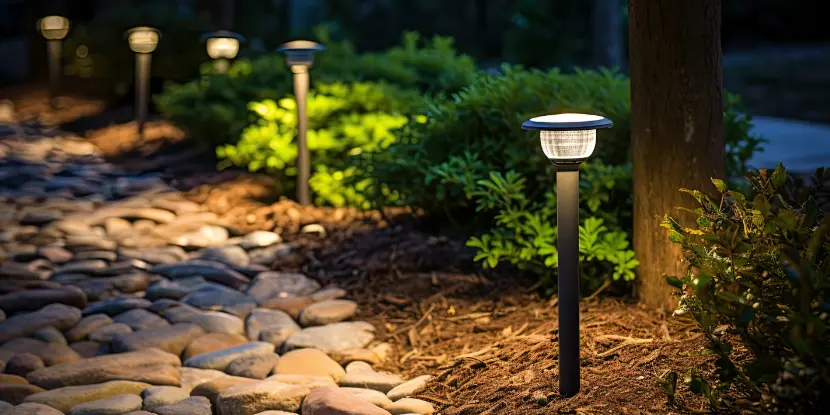
For pathway lighting, solar is the way to go!
4. Fire Pit Lighting
- Purchase fire-safe string lights or LED strips rated for outdoor use. They should be heat-resistant and able to withstand various weather conditions.
- Decide on the placement of the lights in your fire pit area. Will you wrap them around nearby structures or drape them overhead for a cozy canopy effect?
- Measure the length of lighting needed for your layout. This will ensure even distribution and sufficient coverage around the fire pit.
- Anchor the lights with hooks, clips, or zip ties. Keep electrical connections away from the fire’s immediate vicinity.
- Connect the lights to a nearby outdoor outlet, or use solar-powered options. Protect any connections from moisture.
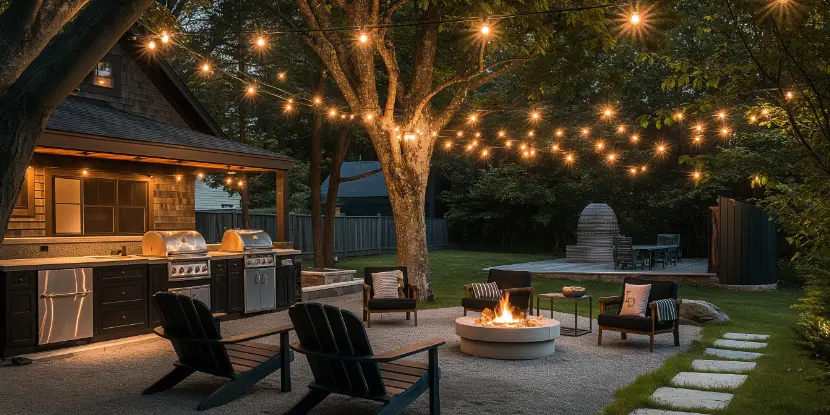
String globe lights enliven a fire pit area.
5. Outdoor Chandelier
- Find a sturdy base for your chandelier — an old hanging basket or pot, a metal or wooden frame, or even a large wreath form.
- Attach outdoor-safe lights to the frame with heavy-duty string. Add ornaments, ribbons, greenery, or other decorations to customize your chandelier.
- Hang the chandelier on a sturdy tree branch or hook in your garden. Secure against swaying in the wind.
- Turn on the lights at night and marvel at your stunning DIY creation.
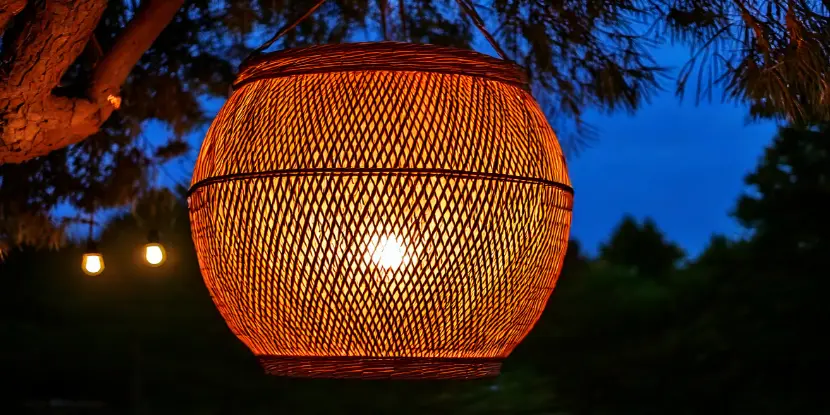
An old basket, wire frame, or hanging pot is all you need to start building an outdoor chandelier.
6. DIY Wine Bottle Tiki Torches
- Find empty wine bottles, wick material, and washers slightly wider than the mouth of a wine bottle.
- Cut the wick to fit inside the bottle. Use a washer or nut around the wick end to prevent it from slipping through the bottle’s neck.
- Fill the bottles with citronella, torch or lamp oil, or other outdoor fuel. Leave about an inch of space at the top so that air can circulate.
- Insert the wicks into each bottle opening. Secure them so they won’t fall out when lit.
- Light your Tiki torches at night to keep pesky bugs away while adding rustic charm to your porch or garden.
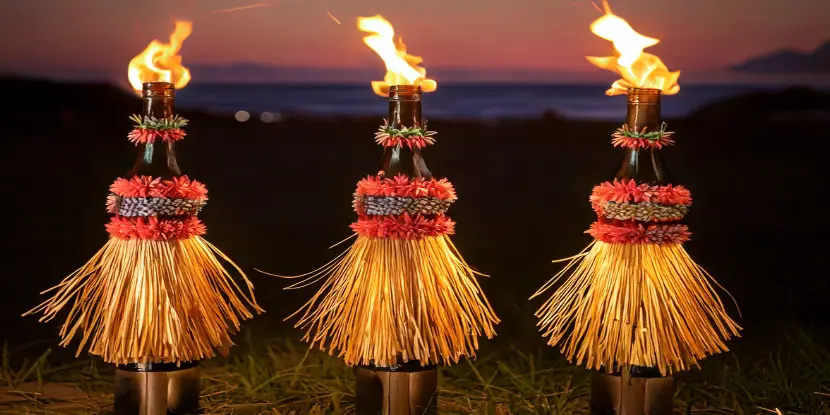
You can dress up your wine bottle Tiki torches however you like.
7. Illuminated Planters
- Purchase translucent, lightweight planters. Plastic works well, but porous terra-cotta also works.
- Group plants in the container by size and color for an eye-catching arrangement.
- Select outdoor-rated LED lights, fairy lights, or battery-operated candles to fit inside your planters.
- Arrange the lights inside the planters, hiding cords and battery packs beneath layers of soil and moss.
- Watch your potted plants radiate with an ethereal glow at night.
8. Hanging Tea Light Globes
- Gather glass globes or jars, tea lights, chains or twine, hooks, or other hanging mechanisms.
- Fill the bottom of each globe with sand for added stability, if needed. Place a tea light inside each globe.
- Hang the globes from tree branches or pergolas in your garden with chains or twine. Secure them with hooks or other hanging devices.
- As the candles flicker inside the globes on a breezy evening, they’ll cast a mesmerizing light throughout your garden.
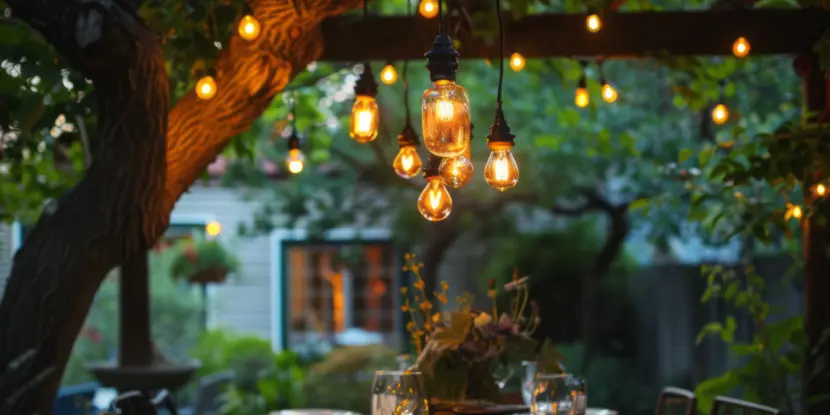
Large globe lights brighten an outdoor dining area.
9. Spotlights & Uplighting
- Use spotlights and uplighting to highlight a specific feature in your garden, such as a tall tree, fountain, or statue.
- Choose LED bulbs that produce high-quality illumination with minimal energy consumption.
- Install the lights low on the ground and point them upward for an impressive display.
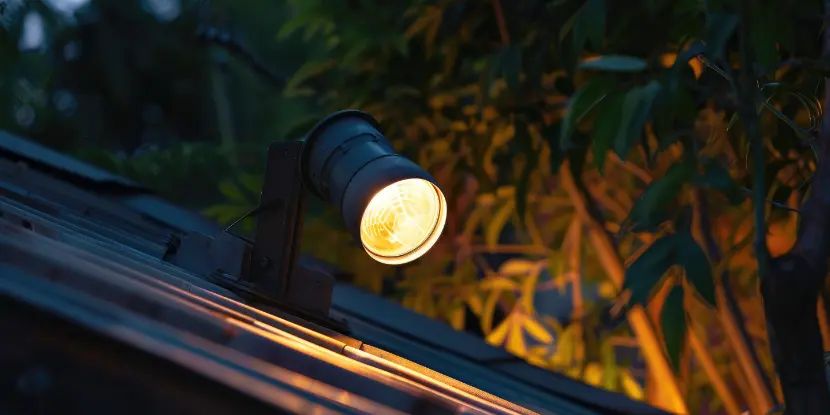
A spotlight can highlight a pond, statue, fountain, or other prominent garden feature.
10. Colored Lights & Gels
- Colored lights and gels can boost the mood of your outdoor lighting design.
- Experiment with different colors. Blue has a calming effect, while red can be exciting and dramatic.
- Place the color filters over your existing outdoor lights for easy customization.
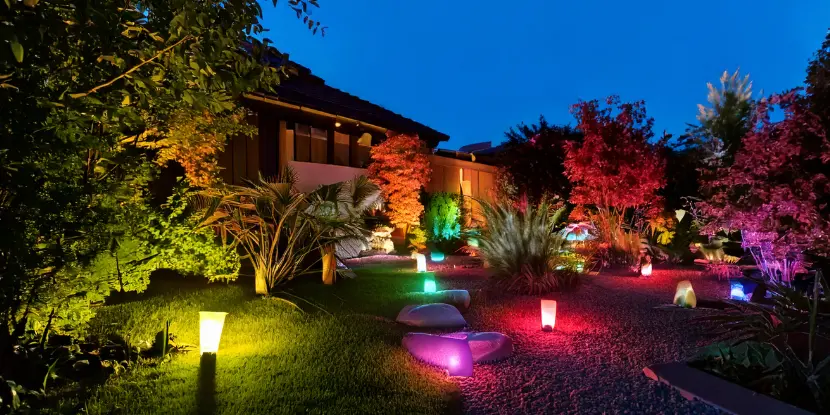
Soft, colored lighting in a yard.
11. Floating Pool or Pond Lights
- Purchase floating, waterproof, and battery-operated LED lights for your pool or pond.
- Turn on the lights and watch them cast mesmerizing patterns on the water’s surface.
- Use colored lights or add flower petals to create a dreamy atmosphere.
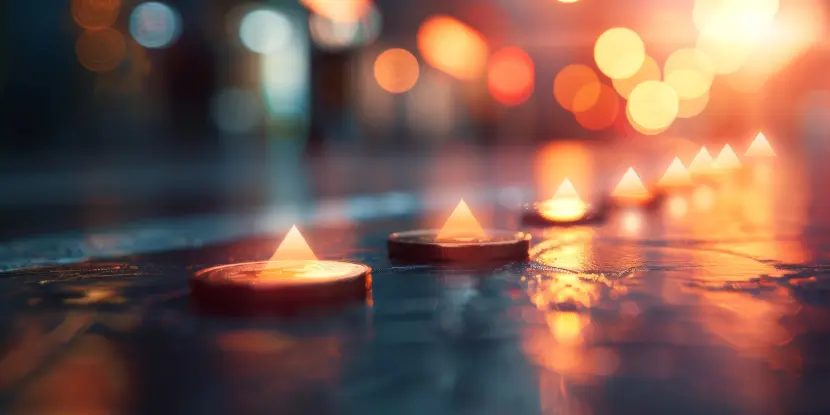
Floating tealights create an almost magical effect.
12. Fairy Light Jars
- Collect jars or bottles of any size and shape. Mason jars, milk jugs, and glass water bottles work well.
- Fill the containers with either battery-operated or solar-powered string lights or fairy lights. Lights that turn on automatically will make your project easier to manage.
- Place the jars on railings and around your garden, hanging from hooks, branches, or stakes.
We hope this blog will motivate you to research more outdoor lighting ideas or stir your imagination to create something entirely new. An outdoor lighting project can begin with nothing more than a mason jar with fairy lights or be as elaborate as you want.
Experiment with different types of lights, and incorporate decorative elements like ribbons or greenery into your lighting displays. Whatever you do, don’t delay — start today!
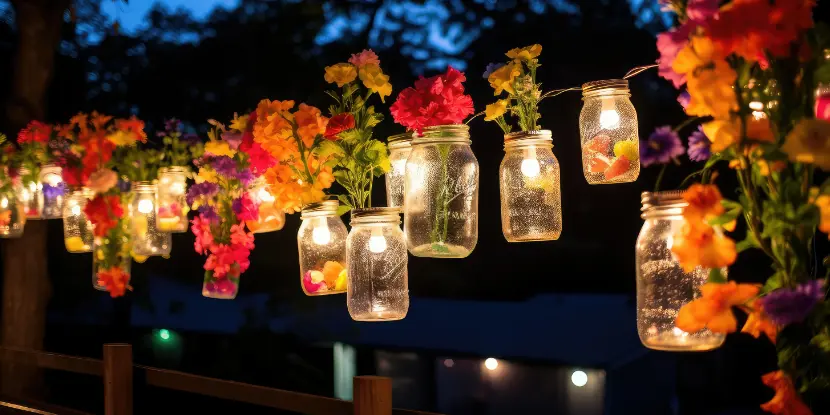
Mason jar lanterns decorated with flowers.
FAQs: DIY Outdoor Lighting
Q: Is it safe to leave outdoor lights on all night?
It depends on the type of lights and their location. Most LED lights are safe to leave on all night. However, if you’re using candles or other open flame sources, always extinguish them before you leave the yard.
Q: How do I choose the right wattage for my outdoor lights?
That will depend on the size of your outdoor space and the purpose of your lighting. Lower-wattage bulbs (around 40–60 watts) should suffice for general ambiance.
Q: Can outdoor lights withstand harsh weather conditions?
Yes, if they’re rated for outdoor use and properly installed to prevent rain, snow, or wind damage. Solar lights, in particular, should be positioned to receive adequate sunlight during the day and may need protection from heavy storms.
Q: What are the benefits of using solar-powered outdoor lights?
Solar-powered lights are energy-efficient and easy to install without complicated wiring. They’re environmentally friendly and can illuminate any area with direct sunlight.
Q: How can I prevent bugs from gathering around my outdoor lights?
Bugs are less attracted to yellow and amber LED lights. You can also try using citronella candles or essential oils, which are natural bug repellents. Keeping your outdoor area clean and free of standing water can also reduce the number of insects attracted to your lights.
Q: Can I use indoor lights for outdoor lighting projects?
No. Indoor lights aren’t built to withstand harsh weather conditions, making them a potential safety hazard. Stick with outdoor-rated lights for all outdoor lighting projects.
Q: How often should I change my outdoor light bulbs
Generally, you should replace outdoor bulbs every 2–3 years or when they start to dim significantly.
Q: What safety measures should I consider when installing outdoor lighting?
Use GFCI outlets for all electrical connections, and keep them covered to prevent moisture. Secure all wiring and avoid routing cables across walkways where they may become trip hazards.
Q: How do I incorporate smart technology into my outdoor lighting?
Smart lights can be controlled via apps or voice commands. You can integrate a smart lighting system using Wi-Fi-enabled bulbs or smart plugs to automate lighting sequences, schedule on/off times, or adjust brightness settings from your smartphone.
Q: Are there eco-friendly options for outdoor lighting?
In addition to solar-powered options, LED bulbs are eco-friendly because they consume up to 80% less energy than traditional bulbs and have a significantly longer lifespan. Solar LED lights and rechargeable batteries also contribute to a more sustainable outdoor lighting approach.

